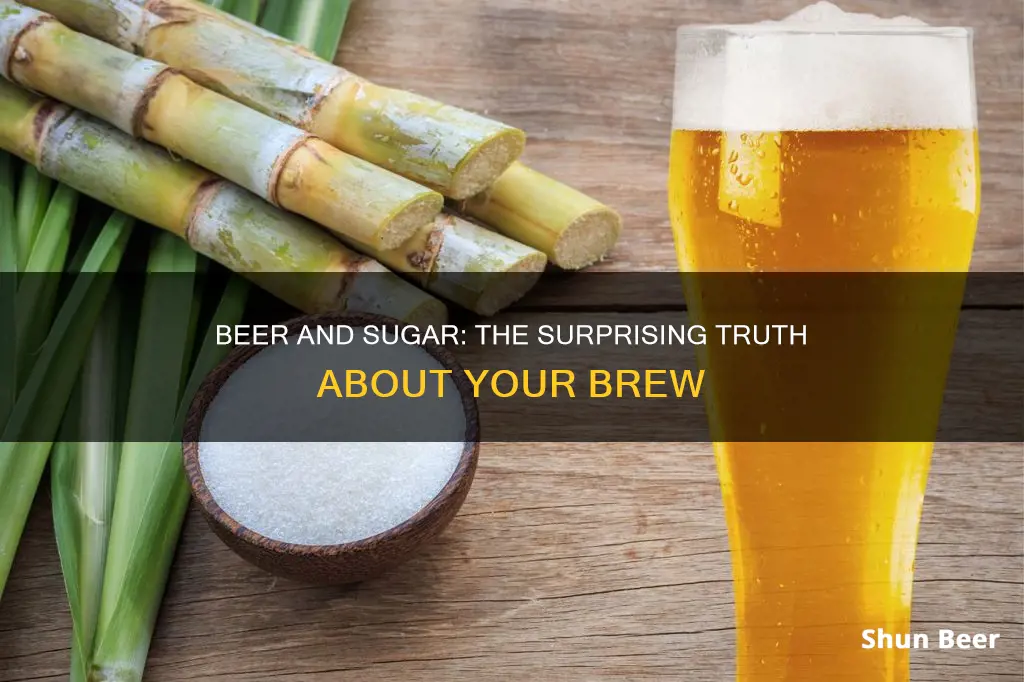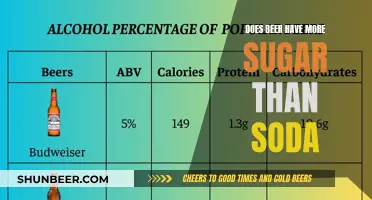
Beer is a beloved beverage, but does it contain processed sugar? This is a question that has puzzled many beer enthusiasts, and the answer is a bit complex. While beer is typically made from yeast, grains, spices, and water, the sugar content can vary depending on several factors. These factors include the type of beer, brewing techniques, and additional flavourings. So, how much sugar is in your beer, and is it something to be concerned about?
What You'll Learn
- Beer is made from yeast, grains, spices, and water
- Sugar is created naturally when grains are processed and fermented by yeast
- Beer gravity refers to the density of liquid extracted from the mashing process
- Beer typically has 80% fermentable sugars and 20% oligosaccharides after fermentation
- Lighter beers tend to have lower sugar content than darker beers

Beer is made from yeast, grains, spices, and water
Beer is made from a few core ingredients: yeast, grains, spices, and water. The specific ingredients used to make beer differ from region to region and from brewery to brewery. However, the categories of these ingredients are always the same.
Yeast
Yeast is a microscopic single-celled organism that feeds on the sugars present in the grain used to make beer. The yeast consumes the sugars and produces alcohol and carbon dioxide as byproducts. Without yeast, beer would not have the same flavour and aroma. There are two main types of yeast used in brewing beer: ale yeast and lager yeast. Ale yeast is a top-fermenting yeast that ferments at a higher temperature and produces a sweeter, fruitier flavour. Lager yeast, on the other hand, is a bottom-fermenting yeast that ferments at a lower temperature and produces a crisper, cleaner flavour.
Grains
Grains give beer three important qualities: malt flavour and aroma, colour, and sugar. The type of grain used in beer brewing has a major impact on the flavour of the beer. For example, wheat beers often have a light, bready flavour, while barley beers tend to have a more malty, sweet flavour. Darker grains will also produce darker beers. Before barley and wheat grains can be used to make beer, they must undergo a malting process. This process involves soaking the seeds in water until the plant starts to grow, then drying them in a kiln. The method of drying can create different colours and flavours of malted grain.
Spices
Spices are sometimes added to beer to give it a unique flavour and aroma. Coriander, cinnamon, nutmeg, and pepper are the most common spices used.
Water
Water is the most oft-forgotten ingredient in beer, but it is essential to the brewing process. The kind of water used can affect how the beer tastes. Beer made with hard water, for example, will have a fuller body and greater bitterness than beer made with soft water.
Budweiser Beer: Sugar Content and Nutritional Facts
You may want to see also

Sugar is created naturally when grains are processed and fermented by yeast
Beer is made from four basic ingredients: grains, water, hops, and yeast. The process of making beer involves extracting the sugars from grains, so that the yeast can turn it into alcohol and carbon dioxide. The grains are put through a gristmill, which cracks and opens the kernels, and are then transported to a mash tun where they are mixed with hot water. During this process, simple sugars in the grain are released, which will later help create alcohol. The mixture is then drained from the mash tun and transferred to a brew kettle, where it is brought to a boil. Hops are added at different intervals to extract aroma, flavour, and bitterness.
The boiling mixture is then cooled and yeast is added to begin the fermentation process. Fermentation is when sugars are transformed into a new product through chemical reactions carried out by microorganisms. In the case of beer, the yeast ferments the sugars in the grain into alcohol and carbon dioxide. This process is called alcoholic fermentation.
So, while beer does not have any added or processed sugar, sugar is indeed created naturally when grains are processed and fermented by yeast. The final sugar content of beer depends on several factors, including its gravity, type of yeast, and any additional flavours that might be included, such as honey or corn syrup. However, the sugar content of beer is generally very low.
Beer's Sugar Impact: What Happens in the Body?
You may want to see also

Beer gravity refers to the density of liquid extracted from the mashing process
Beer gravity, or specific gravity, refers to the density of liquid extracted from the mashing process during the brewing of beer. This liquid, known as the wort, contains sugars that will be converted into alcohol during fermentation. The density of the wort is largely dependent on its sugar content, and this, in turn, influences the final alcohol content of the beer.
The specific gravity of the wort is measured relative to water, which has a density of 1.000. A wort with a higher density than water will have a specific gravity greater than 1.000. For example, a wort with a specific gravity of 1.050 is denser than water and has a higher sugar content.
During fermentation, yeast converts the sugars in the wort into alcohol and carbon dioxide, both of which are less dense than the original sugars. As a result, the specific gravity of the wort decreases over time. By monitoring this decline, brewers can determine when fermentation is complete, which is indicated by a stabilisation of the specific gravity reading.
The original gravity (OG) is measured before fermentation and provides an indication of the potential alcohol content of the beer. A higher original gravity indicates a greater concentration of sugars, which can lead to a higher alcohol content if the yeast ferments these sugars completely. The final gravity (FG) is measured at the end of fermentation and is used to calculate the alcohol by volume (ABV) of the beer. The difference between the original and final gravity values reflects the amount of sugar converted into alcohol.
In addition to influencing alcohol content, beer gravity also affects the flavour, body, and mouthfeel of the beer. Beers with higher original gravity values tend to result in richer, fuller-bodied beers, while those with lower original gravity values produce lighter and more refreshing brews.
To summarise, beer gravity is a critical concept in brewing that refers to the density of the wort and provides insights into the sugar content, potential alcohol content, and overall characteristics of the final beer product.
Beer and Blood Sugar: A Dangerous Mix?
You may want to see also

Beer typically has 80% fermentable sugars and 20% oligosaccharides after fermentation
Beer is made from grains, spices, yeast, and water. While sugar is not listed as an ingredient, it is created naturally when the grains are processed and fermented by yeast. The sugar in beer is created by something called beer gravity, which refers to the density of the liquid extracted from the mashing process during the brewing of beer, known as the wort. When the wort has a lot of sugar, it's called a high-gravity wort.
Once yeast is introduced into the batch, the sugar content generally decreases while the alcohol content goes up. After the fermentation process is complete, beer is typically comprised of 80% fermentable sugars and 20% oligosaccharides, a type of carbohydrate. This final sugar content is based on several factors, including the beer's gravity, the type of yeast, and any additional flavours included, such as honey or corn syrup.
The sugar content of beer can vary depending on its initial gravity and the type of yeast strain used to ferment it. Beer manufacturers may also include other sugar-containing ingredients, such as honey and corn syrup, to add distinctive flavours. However, labelling regulations for alcoholic beverages in the United States do not require manufacturers to report the sugar content of their products, making it difficult to determine the exact sugar content of a beer.
While beer contains sugar, it is important to note that the sugar content tends to be quite low. Additionally, yeast cannot digest oligosaccharides, and neither can the human body, so these are considered calorie-free. Overall, beer is not a significant source of sugar, but it does contain carbohydrates, which can affect blood sugar levels.
Sour Beers: More Sugar, More Problems?
You may want to see also

Lighter beers tend to have lower sugar content than darker beers
Beer is a beloved beverage, but its sugar content has become a concern for many. So, does beer have processed sugar? The answer is a bit complex. While beer is typically made from yeast, grains, spices, and water, it does contain sugar. This sugar, however, is not added directly but is a natural byproduct of the fermentation process, where yeast feeds on the sugars present in the malt, converting them into alcohol and carbon dioxide.
The sugar content in beer can vary depending on factors such as the type of beer, brewing techniques, and additional flavorings. Lighter beers, such as lagers and pilsners, tend to have lower sugar content than their darker and heavier counterparts like stouts and porters. This is because the darker malts used in darker beers have undergone more extensive roasting, which can break down and convert sugars more effectively during brewing.
To understand this difference in sugar content, let's delve into the brewing process. During fermentation, yeast consumes the sugars from the malted grains, and the resulting sugar content depends on how efficiently the yeast does its job. In darker beers, the extensive roasting of the malts makes it easier for the yeast to break down and convert these sugars. Therefore, by the end of the process, darker beers often have a slightly higher sugar content.
The sugar content in lighter beers, on the other hand, is typically lower. Lagers and pilsners, for example, usually have sugar content ranging from 1 to 5 grams per 12-ounce (355 ml) serving. Regular beers, including lagers, pilsners, and pale ales, may contain around 5 to 10 grams of sugar per serving. These lower sugar levels make lighter beers a better option for those watching their carbohydrate intake.
Additionally, it's worth noting that the carbohydrate content in beers can also vary. Regular lagers typically vary in carbohydrate content from about 10 to 15 grams per pint, while some light beers may contain less than 10 grams or even less than 5 grams per pint. Stouts, porters, and Guinness tend to be on the higher end, with upwards of 20 grams of carbohydrates per pint.
In summary, while beer does contain sugar, it is not added processed sugar but rather a natural byproduct of fermentation. Lighter beers tend to have lower sugar content than darker beers due to the different malts used and the efficiency of the yeast in breaking down sugars. However, it's important to remember that sugar content can vary widely depending on various factors, and nutritional labels can provide more specific information.
Beer vs Soda: Which Has More Sugar?
You may want to see also
Frequently asked questions
Beer is made from yeast, grains, spices, and water. Sugar is not added to the ingredients but is created naturally when the grains are processed and fermented by yeast.
The amount of sugar in beer varies depending on the type of beer, brewing techniques, and additional flavorings. Light beers like lagers and pilsners tend to have lower sugar content (1-5 grams per 12-ounce serving) compared to darker and heavier beers like stouts and porters (10-15 grams per 12-ounce serving).
The sugar content of beer is generally very low, so beer drinkers don't need to be overly concerned. However, people watching their carbohydrate intake may want to limit their beer consumption, especially as labeling beer's sugar content is not required by law, making it difficult to pinpoint the exact amount of sugar.







